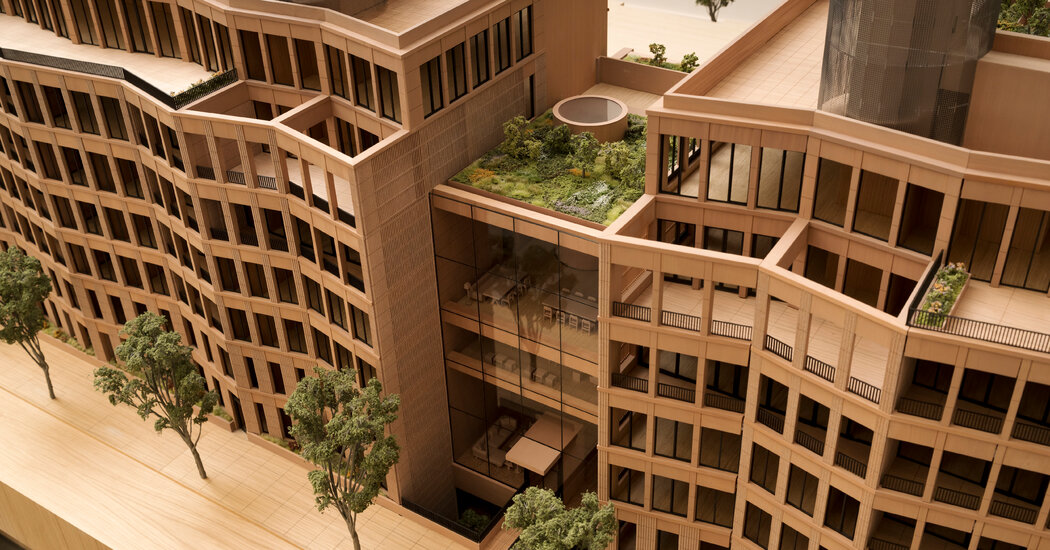Table of Contents
To fit into Boerum Hill, Brooklyn, known for its brownstones and low-key style, new buildings must follow a pattern: Be stately but not flashy, and above all honor the integrity of the neighborhood.
Buildings in Boerum Hill are much lower-profile than the skyscrapers in nearby Downtown Brooklyn and parts of Prospect Heights. One of the newest arrivals, still under construction, is named Bergen. And while the project doesn’t stand out too much in the neighborhood, it doesn’t blend in entirely, either.
The seven-story Bergen is a bit taller than most of its neighbors and occupies much of the block of Bergen Street between Third and Fourth Avenues. In renderings, the exterior, made of precast concrete brick, appears fairly muted — except for its gently pleated, zigzag pattern. The building doesn’t look too ostentatious on a block of brick townhouses, brownstones and some newer apartment complexes.
Bergen’s interiors, however, will be much grander in scale. Residences at Bergen range from studios to five-bedrooms and start at $700,000. (Prices haven’t been set for the larger apartments.) The building will include 12,000 square feet of amenities, including a cold plunge pool, a podcast studio and a steam room, across four floors in the center of the building, with two conjoined rooftops. Bergen will also have a garden area, with terraces for residents and public outdoor space for the community, that will double as the building’s storm water management system.
The project is being designed by the architect Frida Escobedo and her studio in Mexico City. Bergen is the studio’s first condominium project, but design buffs will recognize Ms. Escobedo as the architect charged with designing a new $500 million wing at the Metropolitan Museum of Art.
DXA Studio did the master planning for the project, and Workstead did the interior design. The developer, Avdoo & Partners, isn’t new to the neighborhood; the real estate firm also opened the nearby 58 St. Marks Place, which stands out in a way Bergen doesn’t.
“The context of a neighborhood and the type of building that we want to build in the neighborhood are very important,” said Shlomi Avdoo, the firm’s founder. “Respectful design is important for us, and the history of the neighborhood is important.”
Bergen is scheduled to be completed in late 2024 or early 2025, though potential buyers can get a glimpse of the project at a sales gallery a few blocks away.
These interviews have been edited for clarity.
Frida Escobedo, architect
I do feel that for housing projects, it’s fundamental for people to feel that they are part of a community, but at the same time they have their own space and they can be recognized within that space.
One of the principal ideas was to have a residential compound that is relatively large in comparison with the adjacent buildings, and how to keep that human scale and the scale of the neighborhood.
You have raw materials that express a very clear language that we hope is going to age nicely and create some sort of language that would hold the passage of time. That’s always the intention. We want to be very aware that that is also a sustainability question, that we have buildings that age nicely — and that’s better for everyone.
Jordan Rogove, master planner and landscape designer
The world’s changing. The temperatures are changing. And so we thought, “Let’s actually show how that works and celebrate how the building is adapting to a changing environment.” You imagine waterfalls and rivers and little channels where the water goes through. The sound of water and the sight of a waterfall are very calming, and that adds to the idea that this is an oasis for you, that as you’re passing through and experiencing this, there’s a series of delightful or charming experiences, as opposed to all this being hidden.
Ryan Mahoney, interior designer
We were super excited that Frida was one of our collaborators, and so we wanted to have our work be a nice complement to what Frida was doing. There’s a really incredible collection of amenities, and so we wanted the project to have a calming, tranquil effect and encourage this refuge from the city, where everything’s so hectic. You kind of have this opportunity to really be transported a little bit.
We had a lot of conversations about brownstone living, the proportions of brownstones and how they meet the street. And, obviously, this is not a brownstone, but everyone’s effort was to try and make this large development into something that had some connection to this world. I think we were trying to bring many things in Brooklyn and try and connect the dots together.
Shlomi Avdoo, Avdoo & Partners founder
Every project is sort of different in its own way. It’s almost like having kids — they’re all special in their own odd way, they’re different, and they’re the same because they come from the same parent. For us, the same sort of building blocks for design, which is building a community that, at the end of the day, binds people together, creates new relationships and somehow is tied to the community. Working with simple materials that are durable, that stand the test of time, but at the same time are very special in one way or another.


